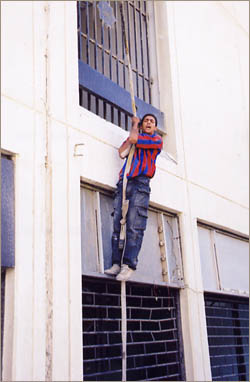 |
 |  |
|||||||||
 |
Home | The Sunni Heartland | The Unexpected War | Paying the Price |
|||||||||
|
The Unexpected War A Brilliant Con But the growing hostility was unmistakable. Part of the blame rests with Washington's pre-war misconceptions, a failure to understand Iraqi nationalism and deep mistrust of the United States. Another misconception-Iraqi exiles, who had not been in Iraq for years - convinced the Bush administration that a liberated Iraq would greet the American military with open arms. It didn't happen that way says former CIA agent Bob Baer. "It was a con," says Baer. "It was a brilliant con. I know all these people. They're very articulate. They speak brilliant English; they know more about Iraq than we'll ever know. The problem is, they're exiles and you just can't trust exile groups. They had a dog in the fight, if you like. They wanted us to invade. They cooked the information, slanted analysis. And Washington is a hot house and this just took a life of it's own."
"It isn't that the United States failed to protect everything. It failed to protect anything," says Peter Galbraith, a National War College professor who was in Baghdad at the end of the war. "And the only conclusion I can draw from what happened is that there was no plan in particular to protect key public institutions in Baghdad." One unprotected institution was Iraq's nuclear research facility. Iraqi looters carted away barrels that contained dangerous nuclear material. The U.S. military eventually secured the facility and the looted material, but for more than a month, looting continued in the rest of Iraq's largest nuclear research facility. There were not enough soldiers to stop it. The looters came in waves, carrying away metal frames, stacks of wood, rusty barrels, men in frayed shirts, school boys in ragged pants carting away anything of value. "The looting has been absolutely devastating," says Peter Galbraith, "every single public institution in Baghdad was looted and most of them were burned...Now these institution are all linked to Iraqi professionals...whether it's a university that was looted, a government worker in a ministry, whether he's involved in the court system or a doctor at a hospital. And so the looting was profoundly demoralizing for Iraqi professionals who are the very people with whom the United States wants to work and needs to work." The early, unchecked, looting gave way to more organized crime, daytime robberies, car jacking and kidnapping, and sent a message, says Peter Galbraith, that the Americans could not control the country. "In particular," says Galbraith, "it led Iraqis who didn't like the fact that America came in, to believe they could successfully challenge American authority." |
||||||||||
